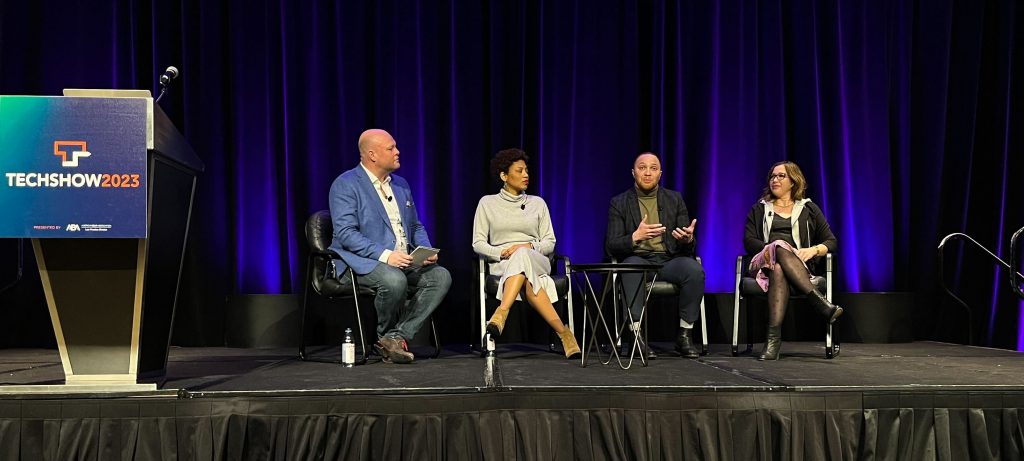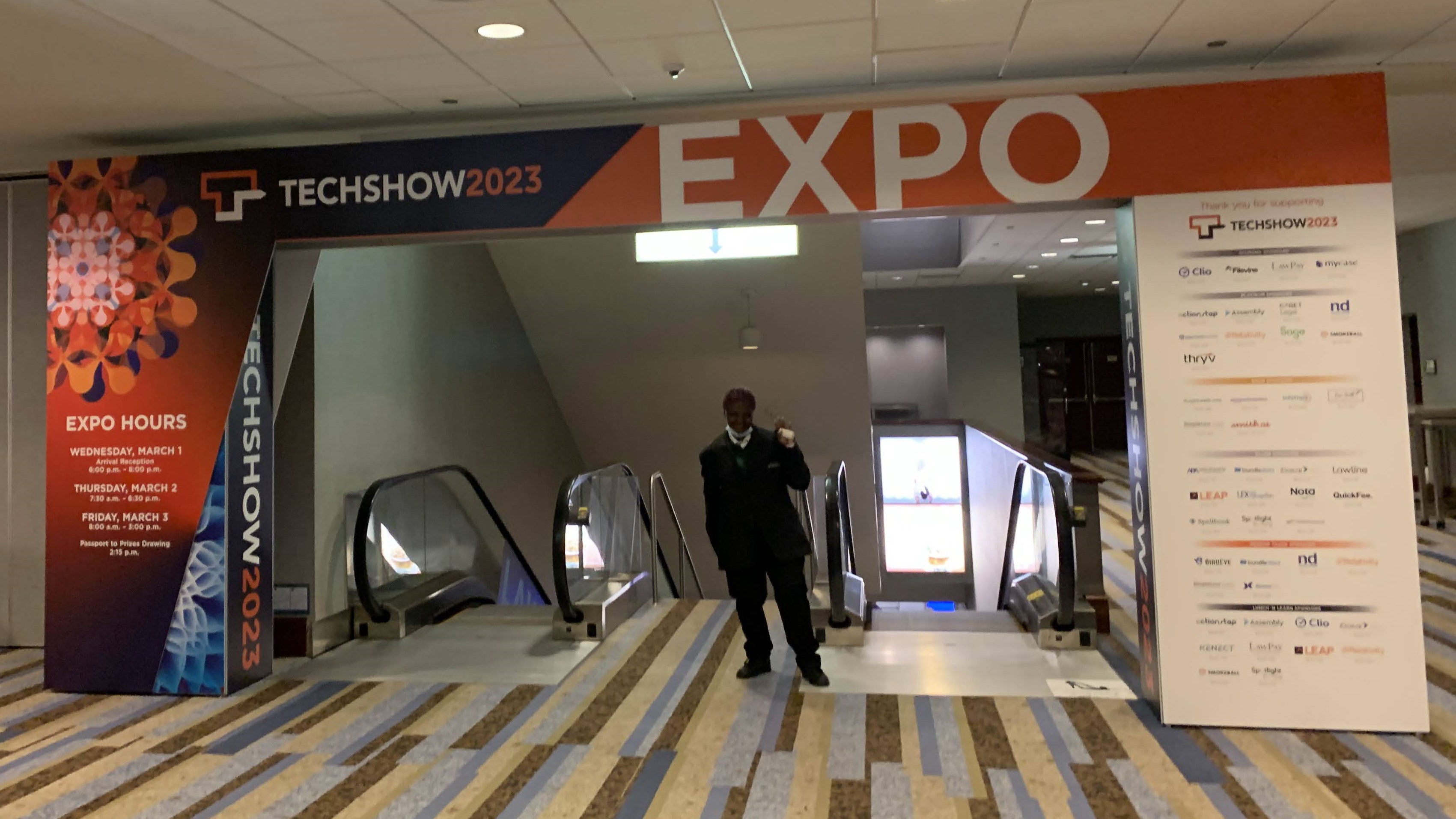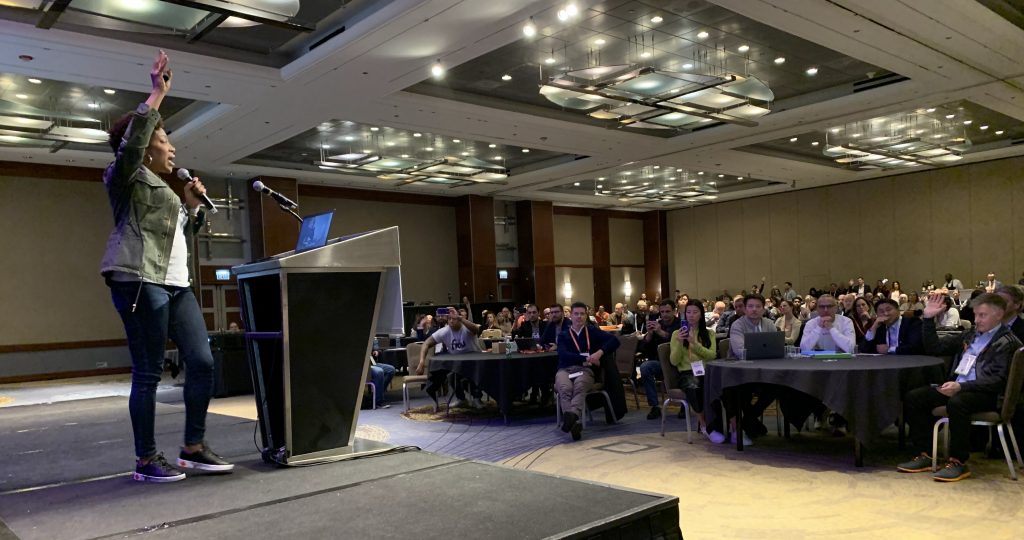At ABA TECHSHOW in Chicago last week, it struck me that it is conceivable that an attendee could be the third generation within a family to have been to a TECHSHOW. After all, the conference was first held nearly four decades ago, way back in in 1987. That means that, in a multi-generational family of lawyers, an attendee this year could well have had a parent and grandparent attend in some prior year. That is pure speculation, of course, but the point is that TECHSHOW has been around so long that the original attendees are now probably someone’s grandparents.
For TECHSHOW, that endurance is both a blessing and a curse. The blessing is that its longstanding reputation as a preeminent and trailblazing legal tech show enables it to attract A-list speakers and a loyal contingent of attendees. The curse is that the show has, in some years, showed signs of its age, and for a period, it seemed to have been stuck in a legacy rut. As a greater number and variety of legal tech conferences have sprung up in recent years, the challenge for the 36-year-old TECHSHOW is to continue to deliver the kind of practical programming lawyers have come to expect, while also being as sprightly and cutting-edge as the newer generation of conferences.
It is a daunting challenge indeed. In fact, several years ago, the ABA convened a somewhat-stealth committee, separate from the TECHSHOW planning board, to brainstorm the longer-term vision for TECHSHOW and come up with ways to give it a contemporary refresh. Having been roped into volunteered for that committee, I can tell you that we never came up with any magic formulas.
Against this backdrop, I am pleased to report that TECHSHOW 2023 was not your grandparents’ TECHSHOW — not even your parents’ TECHSHOW. The atmosphere was highly energized, the audience was highly enthusiastic, and the overall focus skillfully maintained that balance between practical and cutting edge. The programs were informative and compelling and the numbers of both attendees and exhibitors exceeded the pre-Pandemic numbers of TECHSHOW 2020.

Six of the panelists from the weekly Legaltech Week podcast got to hang out: Steve Embry, Victor Li, Stephanie Wilkins, Niki Black, Joe Patrice, and me.
Credit for all of this goes to the TECHSHOW planning board. If you are not aware of what happens behind the curtains of TECHSHOW, it is all planned and put together by a volunteer board of legal professionals who sink considerable time and effort into the planning process. This year’s board was co-chaired by Jeannine Lambert; executive director of centers and programming at Northern Kentucky University Chase College of Law; and Gyi Tsakalakis, founder of AttorneySync; with assistance from co-vice-chairs Sofia Stefanie Lingos, founding and managing attorney of Trident Legal; and Cynthia Thomas, owner of law firm management consulting company PLMC & Associates.
Other members of the board were Heidi Barcus, shareholder at Lewis Thomason; Kenton Brice, director of technology innovation at the University of Oklahoma College of Law; Nkoyo-Ene Effiong, director of the Law Practice Management Program for the State Bar of Georgia; Carolyn Elefant, owner of Law Offices of Carolyn Elefant and publisher of MyShingle.com; Ivan Hemmans, senior manager of technical development at O’Melveny & Myers LLP; Darla Jackson, director of the Mabee Legal Information Center at the University of Tulsa College of Law; and Jayne R. Reardon, former executive director of the Illinois Supreme Court Commission on Professionalism.
One stroke of conference-planning genius this year was to abandon the standard keynote presentations in favor of keynote sessions that tackled contemporary topics in dynamic ways.
Let’s face it: Keynote speakers more often fall flat than inspire. (I say that as someone who has been a keynoter.) Conference organizers throw too much money at big names who know nothing about the audience, in the hope that they’ll help draw attendance. Keynote sessions are often a waste of the conference’s money and the attendees’ time.

The legaltech visionaries panel was moderated by Jack Newton of Clio and featured Kimberly Bennett of Fidu, Jazz Hampton of TurnSignl and Erin Levine of Hello Divorce.
This year, TECHSHOW scratched keynotes and replaced them with two interactive sessions. On the first day was a panel of “legaltech visionaries” – aka legal tech company founders Erin Levine of Hello Divorce, Kimberly Bennett of Fidu, and Jazz Hampton of TurnSignl – in a conversation moderated by Jack Newton, founder and CEO of Clio. Notably, while this panel could easily have addressed itself to budding entrepreneurs, it instead stayed focus on TECHSHOW’s true audience, legal practitioners, helping them understand why these companies matter to them and their clients.
The second day keynote session was a mock public hearing on proposals to amend Professional Conduct Rules 5.4 and 5.5. Moderated by the aforementioned Jayne Reardon, the idea was to stage a fictional committee meeting to debate changes similar to those adopted in Utah and Arizona. Although I did not attend this session, I heard nothing but rave reviews. Even without having attended, I have no doubt that, for those who did, it was far more engaging than yet another clueless big name speaker.
Beyond these keynote sessions, the panels spanned a balance of practical, contemporary, and future-looking subjects, with topics that ranged from the basic (such as what’s new in Word) to the current (AI and data analytics) to the next (the hybrid law firm of the future).
Once again this year, I hosted the opening night event, the Startup Alley pitch competition. I’ve already posted about something that happened during that event, and I’ll post separately about the results.
The only program that felt like a throwback to TECHSHOWs long past was the “60 in 60” plenary program. TECHSHOW has a longstanding tradition of wrapping up with a rapid-fire session that has evolved from 60 sites to 60 tips to 60 gadgets and gizmos. This year’s program was intended to be a mash-up of all of those. But to me, it felt like an oldies show on an obscure cable channel. How many of these sites and tips and gizmos have we seen before, and how many years ago did we first see them? (Text Expander, I’m looking at you.)
My only other complaint – which is really a compliment – is that it all seemed too short. The exhibit hall opened Wednesday night with a reception and closed 2 p.m. Friday (an hour earlier than planned, thanks to threats of snow). That left little time to both attend sessions and browse booths. While TECHSHOW traditionally spilled over into Saturday, this year it ended Friday night, save for a Saturday morning breakfast. That had many people already heading out just two days after they’d arrived.
But these are minor nits. My impression – and the consensus of everyone I asked – was that this was one of the best TECHSHOWs ever, at once practical and vital and relevant.
It certainly was not your grandparents’ TECHSHOW.
 Robert Ambrogi Blog
Robert Ambrogi Blog
